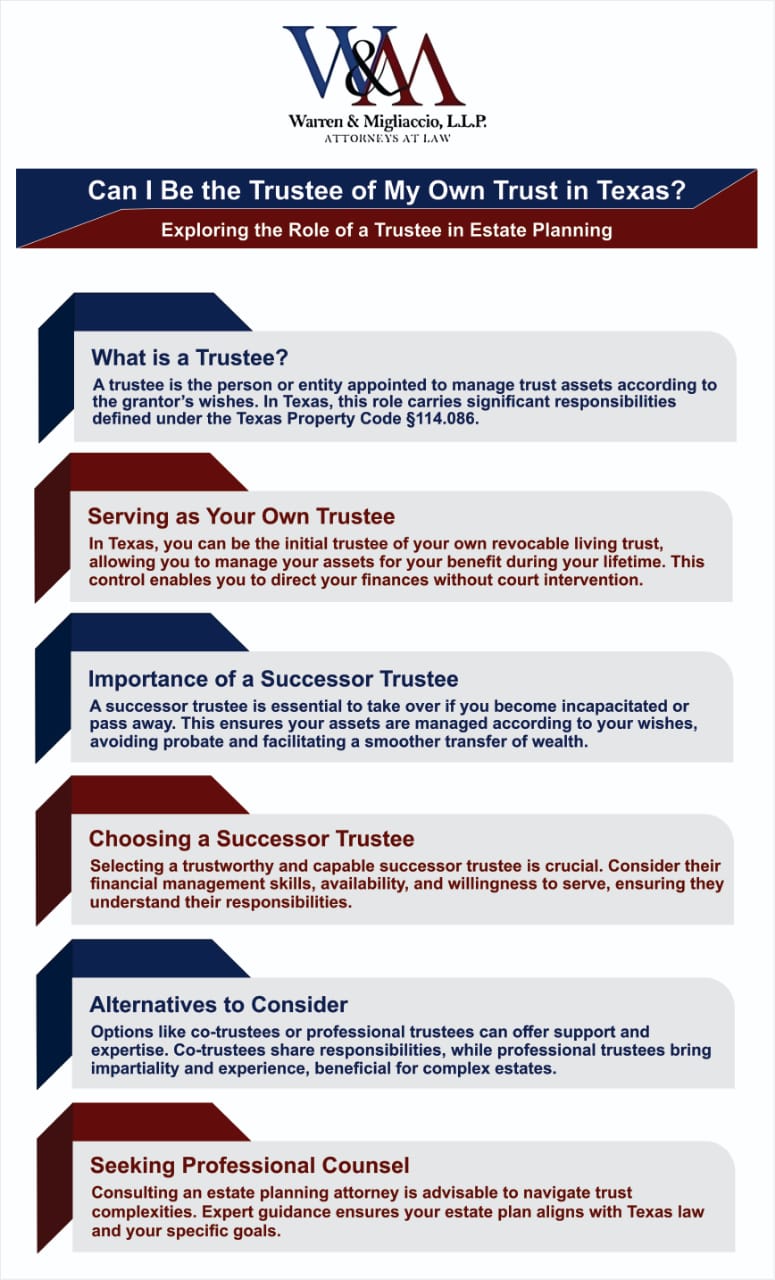Considering a living trust as part of your estate planning? This might lead you to ask, “Can I be the trustee of my own trust?” It’s a common question with an answer that’s not always straightforward. It depends on your goals, the type of trust, and the laws of your state.
This article zeroes in on Texas law, specifically focusing on revocable living trusts. This kind of trust, which is a useful estate planning tool, offers flexibility during your lifetime while ensuring your assets are managed according to your wishes, even after you’re gone.
Unraveling the Role of a Trustee in Texas
In the world of estate planning, a trust stands as a powerful tool. A trust administration lets you, the grantor, decide how to manage your assets while you’re alive. You can also distribute these assets after your passing through a trust. Central to this structure is the trustee—the person or entity you appoint to carry out your wishes regarding each trust asset. Think of them as the captain steering your ship of assets in the direction you’ve charted.
The Texas Property Code §114.086 details the responsibilities of a trustee, emphasizing the significant level of responsibility entrusted to them. This role requires diligence, organization, and a commitment to acting in the best interests of the beneficiaries. These legal relationships ensure the trust is managed properly. This management includes business asset protection, tax compliance, and distribution according to your wishes.

Can I Be the Trustee of My Own Trust in Texas: The Breakdown
In Texas, you can serve as the initial trustee of your own revocable trust. It’s like being the captain of your own ship. You’re managing your assets, including real estate, for your benefit while you’re able.
This appeals to many because it allows direct control over your finances, including family business assets, and avoids court interference. However, since life throws curveballs, a successor trustee takes the helm if you become unable to manage your trust due to incapacity or death.
This successor trustee makes sure your assets are managed by someone you’ve already designated, aligning with your wishes even when you cannot directly oversee things. This process helps to avoid probate court and ensures a smoother transfer of wealth.
Texas Property Code Section 114.086 clarifies some instances when a successor trustee steps in. Let’s illustrate with an example:
Let’s say John establishes a revocable living trust, naming himself as the trustee and primary beneficiary. He designates his daughter, Sarah, as his successor trustee. If John faces a health crisis and becomes unable to manage his affairs, Sarah will automatically step into the trustee role.
She’ll be responsible for handling the trust’s assets as outlined in the trust agreement, ensuring John’s needs are met and his wishes are followed. This ensures continuity in the management of the trust assets.
Benefits of Being Your Own Trustee
Why might someone choose to take on this role? This approach offers several advantages, particularly when it comes to managing business asset, making it a common choice for many individuals.
- Continued Control: You retain control over your assets and how they are managed during your lifetime.
- Privacy: A revocable living trust’s assets typically aren’t subject to the public probate process, maintaining a level of discretion regarding your finances.
- Flexibility: You can modify the trust terms, including those related to an asset protection trust, or even revoke the entire trust if your circumstances or wishes change. This gives you adaptability in your estate plan.

Navigating Successor Trustees and Potential Pitfalls
Texas law, particularly Code §§ 401.001, 401.002, and 401.003 (2024), highlights the importance of a successor trustee. The successor trustee ensures the continuity of the trust’s purpose.
What happens if a trust doesn’t have a successor trustee, or the named one can’t serve? In situations like this, a Texas court would typically appoint a trustee. But here’s the rub—this can sometimes go against your original intentions for the estate plan.
Imagine meticulously planning your estate through living trust, only to have some aspects potentially overturned because of a legal technicality. This emphasizes the importance of carefully selecting and designating a successor trustee you trust.
Consider these factors when choosing a successor trustee:
|
Factor |
Description |
|---|---|
|
Trustworthiness |
Go for someone known for their integrity, honesty, and ability to handle finances responsibly. Look for someone who has a proven track record of managing their own finances well. |
|
Practical Skills |
Does your potential trustee possess good organizational and financial management skills? Consider their experience in managing investments or handling legal and financial matters. |
|
Availability and willingness to serve |
It is crucial to discuss this role with your chosen trustee beforehand. Ensure they understand the responsibilities involved and are willing to commit their time and effort. |
You may wonder, “What if my chosen trustee changes their mind down the road?” Good news — Texas law provides for this. Your trust agreement can have instructions on how a successor trustee can be replaced if necessary. This provision allows for flexibility in case your chosen trustee is unable or unwilling to serve in the future.
Alternatives to Consider
You don’t have to go it alone. Explore alternatives that align with your needs and provide peace of mind:
- Co-Trustee: Sharing responsibilities with a spouse, trusted friend, or family member can distribute the workload. It can also provide checks and balances, especially when dealing with potential conflicts of interest. A co-trustee can bring additional expertise or perspective to the management of the trust, especially when dealing with small business operations or decisions. They can also offer support and assistance, ensuring that the trust’s terms are carried out effectively.
- Professional Trustee: If your financial affairs are complex or you want a neutral third party, a bank’s trust department, trust company, or experienced professional trustee may be an excellent solution. Professional trustees specialize in trust administration, ensuring compliance with legal and financial regulations. They bring impartiality and expertise to the table, particularly beneficial for complex estates or situations with potential family conflicts.
Seeking Professional Counsel
Trusts come with complexities, and navigating the legal intricacies on your own is rarely a good idea. While you may think “Can I be the trustee of my own trust?” and the answer may seem straightforward, there’s often more beneath the surface.
Mistakes can be costly, and the last thing you want is your carefully crafted estate planning strategy hitting a snag. Consulting with an estate planning attorney in Los Angeles or a trusted financial advisor can provide clarity and guidance, especially for a business owner looking to protect business assets.
Seeking guidance from an estate planning attorney can make all the difference. A seasoned legal professional familiar with Texas law can provide invaluable support tailored to your unique situation, guiding you through the maze of decisions with confidence. They can help you understand the intricacies of trust administration and ensure your estate plan aligns with your wishes.

Frequently Asked Questions
Can I Name Myself as Trustee of My Own Trust?
Yes, in Texas, you are permitted to name yourself as the trustee of your own revocable living trust. This allows you to manage the assets throughout your lifetime. However, a successor trustee will be essential to manage the trust when you are no longer able to do so.
Who Is the Best Person To Be a Trustee?
Selecting the best person as your successor trustee requires careful consideration. You should prioritize trustworthiness and good financial management skills above all else. Consider their:1. Responsibility2. Financial knowledge.3. Integrity to act in the best interest of your beneficiaries.Communicate with your chosen successor trustee to ensure they are willing to take on this responsibility.
Who Is Usually the Trustee of a Trust?
Often, grantors in Texas choose to act as the initial trustee of their own revocable living trusts. Upon their death or incapacity, a designated successor trustee takes over, ensuring the trust’s terms are carried out. This is a standard practice, allowing the grantor to manage their assets during their lifetime and ensuring a smooth transition upon their passing.
Can the Creator of an Irrevocable Trust Be a Trustee?
While technically permissible, it’s generally inadvisable for the creator of an irrevocable trust to be the sole trustee. Doing so might dilute the purpose of the irrevocable trust, as you remain in direct control of the assets, potentially jeopardizing the asset protection benefits usually associated with such trusts.
Conclusion
Before making a critical decision like serving as the trustee of your own trust, it’s wise to seek the counsel of an experienced estate planning attorney. This decision is like casting a stone into the water – it will create concentric circles of change that will lap up against the shores of your life, changing the tides for you and those who depend on you. Setting up your trust correctly requires careful planning, and getting expert advice can give you peace of mind that your wishes will be respected in the long run.
Our experienced estate planning attorneys in Texas are ready to help you create an estate plan that meets your needs and goals. Collaborate with us and we’ll drive progress together. Tune out the noise, tune in to the know-how, and hear your progress roar to life. Call us at (888) 584-9614 or contact us online to start planning your estate today. Create a trust and you’ll gain a level of confidence, knowing your legacy is protected and your family’s interests are safe.

